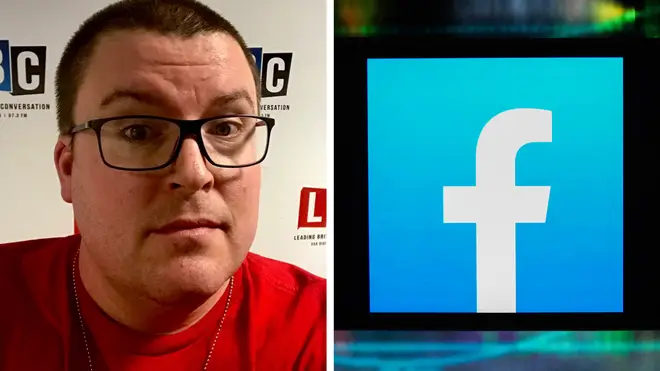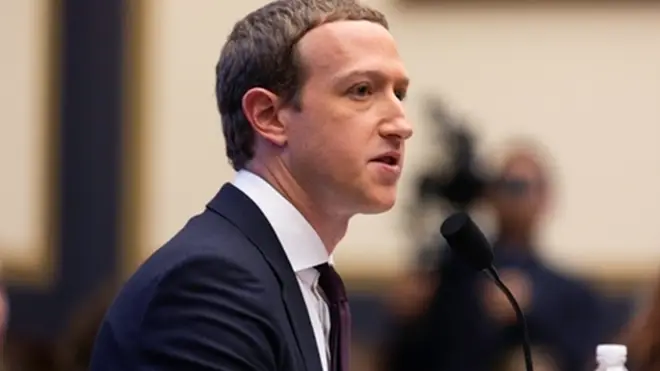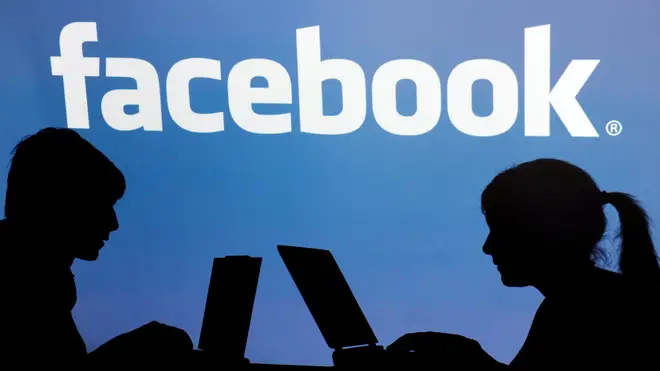
Nick Abbot 10pm - 1am
10 December 2020, 13:08 | Updated: 10 December 2020, 13:16

The US government and more than 45 states have sued Facebook, accusing it of taking illegal action to buy up rivals.
I’m not sure even Mark Zuckerberg is entirely sure what the future holds for his currently mighty Facebook Inc - but I’m pretty confident he’s just had his worst night of sleep for many years.
Full disclosure - I had a great time working for both Facebook and Instagram - but the closest I got to Zuckerberg was being politely encouraged on my first day of induction at its Disney-like HQ 30 miles out of San Francisco to not stare though the big glass windows of his ground-floor office, because it was hugely off-putting for the boss and his guests to be gawped at, a bit like walking past Nick Ferrari’s LBC studio when he’s in his pomp.
Read more: US government begins legal action to break up Facebook's social media 'monopoly'

Unusually, Facebook has come out fighting in response to the news that the FTC and 48 states were attempting to sue it out of its current existence. So angry was Facebook, that it took to Twitter.
In a near Trumpian strategy - the company used a stream of tweets to decry a “revisionist history” and the FTC wanting a “do-over.”
On the surface, it indeed seems very strange that the FTC is now gunning for the break up of the world’s largest social media company - particularly when it greenlit its purchase of photosharing app Instagram in 2012 for $1bn and Whatsapp for $19bn in 2014.

But as a former FTC leader pointed out overnight - new evidence can come to light at any time, and allow the FTC to revisit its previous decisions.
On the sidelines, you have to wonder whether the company’s continued attempts to brush off investigation or legislation have prompted this change of tact - but it would appear the FTC is focusing on internal emails from Zuckerberg himself that suggests the FTC believes there was a “systematic strategy to eliminate competitors.”
A text message from Instagram co-founder Kevin Systrom will also be of particular interest to the FTC - in conversation with a trusted friend and advisor ahead of the sale to Facebook, he was pondering whether Zuckerberg would “go harder into destroy mode” if they did not sell to him.
This is the kind of text that may eventually be Facebook’s undoing.
The claims go deeper - according to the FTC, Facebook wasn’t just buying its competitors - it was also stifling competition at a lower level.
Services like Facebook are built around things called APIs - imagine them as a framework that comes with a Haynes manual like your old Ford Fiesta - making it easy for developers to integrate key bits of Facebook’s platform.
The FTC alleges access was cut off to any perceived competitors - rivals in the social network space, mobile messaging apps, and others which may have benefited using them.
So what happens next? If you’re a Facebook hater - you’re probably very pleased this morning, judged by the number of people that feel excited about its potential demise - but if you’re more reasonable you have to take a more measured view of what could happen.
Who is going to have the money to take on a platform like Instagram or Whatsapp? The reality is it moves to another large corporation - potentially a Google, an Amazon, or maybe Microsoft. How about if Bytedance or a Chinese company offer their cash for it?
Could you see the US or other governments around the world allowing that to happen?
In the UK Facebook has somewhere between 3000 and 4000 employees - largely in highly skilled engineering roles, and if you’re worried about Facebook’s stance on paying UK taxes, you can be assured its employees certainly are. There’s also a huge economy that’s developed around these platforms - from my favourite Ice Cream shop in Swindon posting to Facebook, to the celebrity influencer making big money on instagram.
And if Facebook loses Whatsapp or Instagram - what’s to stop it doubling-down on making similar features on their platform - which still has over 1bn monthly users itself.
Whatever happens next, it feels like 2021 is going to be a big year for technology….